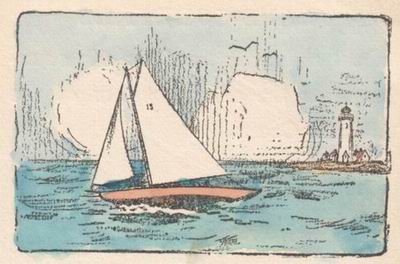| Copyright, Kellscraft Studio 1999-2003 (Return to Web Text-ures) |
Click
Here to return to Cape Coddities Content Page Click here to return to Previous Chapter |
 (HOME) |
| Copyright, Kellscraft Studio 1999-2003 (Return to Web Text-ures) |
Click
Here to return to Cape Coddities Content Page Click here to return to Previous Chapter |
 (HOME) |
 XI "A WET SHEET AND A FLOWING SEA" IN my youthful days I often wondered at the regularity with which elderly people would go out to drive day after day, sitting in the same seat in the same carriage, behind the same horses, driven by the same coachman along the same roads. It seemed to me a lamentable waste of time. And now I have more or less (less as the years advance) the same feeling toward those couples whose chief relaxation is a spin along the state roads of their district in a well-appointed limousine, for I belong to that class of motorists who use their cars purely for convenience and prefer the fresh-air variety. Yet, when it comes to sailing, for some reason which I am at a loss to explain, my views are diametrically opposite. I am content to clamber into my knockabout and to perform the routine labor of pumping "her" out, unfurling and hoisting the sail, and casting off, then to cruise lazily about our harbor, sailing over the same course day in and day out with little variation, and to do this either alone or with a kindred spirit as the case may be. To many these cases may seem parallel, but to me they are widely variant. There is a formality to a drive or a motor ride which starts with the costume worn and ends with the character of conversation. On a boat -- and I am speaking entirely of small boats -- the costume is of a heterogeneous variety and the conversation of the freest. In fact, there is something so thoroughly unconventional about life on the water that even the stiffest of Brahminian Bostonians may occasionally be heard to indulge in slang and to assume a rakish attitude, perched upon deck. But such criticism, or rather comparison, is highly superficial. There is more to it than external appearance; for sailing brings out the best in human nature, encourages philosophy, develops independence of thought and act, and largely so because those who sail shed their coating of reserve and allow their natural feelings fair play. There is no quicker way to know and size up one's friends than to go on a cruise for a few days. There is no better way of enjoying and extending one's friendships with both sexes than spending a few afternoons sailing together, skirting along the shore with a fair breeze, nor is there any quicker way of learning the weaknesses of certain individuals than by observing their conduct under perhaps less peaceful conditions at sea. For the best of skippers cannot predict weather conditions, and there are times when wind and storm will come upon one with surprising quickness. Here in New England, the sailing fraternity may be divided into those who prefer the Maine coast and those who cling to the Cape and Buzzard's Bay. As one of the latter class, I always claim our supremacy by stating two points which I believe to be true: first, that we have more wind, and second, that we have less fog. To me this is convincing. The southwest wind which cools the Cape, blows nearly every day in summer and with a strength that often requires reefing. Rarely between ten in the morning and five at night will the mariner find himself becalmed in Buzzard's Bay. In fact, the stranger is generally amazed to see girls and young boys sailing without the presence of an older person, in what looks to him a three-reef breeze. They have been brought up to it and realize that vigilance must always be exercised on the water, and they know the qualities of their boat and the power of the wind. I know of no better training for youngsters who are proficient in swimming than to learn to sail and race their own little boats. The development of a power of observation, accurate judgment, prompt action, and steady nerve comes more quickly with the handling of a boat than in any other way for those who lead our kind of life. Sailing is confined to boats, but boats are not by any means confined to sailing, for latterly there are almost as many motor-boats to be found chugging along the shores of the Cape as there are sailboats, although I personally always pity the groups in the stern of one of these modern affairs which makes its noisy passage leaving an odorous wake of oil and smoke. But doubtless I am extreme in my views and old-fashioned in my taste. Give me a knockabout -- a fifteen-footer for real comfort for a daily sail, a stiff member of the twenty-one-foot class for cruising along shore. Give me a comfortable catboat, broad of beam, for a family boat or for a day's fishing, or let me idle about in one of our little twelve-foot Herreshoff class with my small son. In any one of them I shall find the same sense of freedom, the same sort of pleasure, and the same love for the salt sea, and from each I shall look at the windy, sandy shores of the Cape with the same loyal affection. 
|